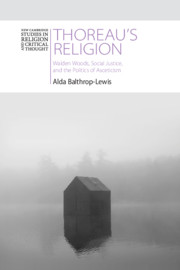‘This book is undoubtedly the best treatment of Thoreau in this generation. Alda Balthrop-Lewis is a profound philosopher-poet who captures the subtle and sublime genius of the great philosopher-poet like no other. And in these bleak times of ecological catastrophe we need them both!'
Cornel West - Harvard University
‘This beautifully written volume offers a wonderful depiction of Thoreau as a person and a thinker for this time and place; really, everyone who's interested in his story, and in the American story, should read it and reflect on it.'
Bill McKibben - Middlebury College
‘With extraordinary patience and clarity, Balthrop-Lewis guides well-meaning readers in appreciating Thoreau’s aesthetics and ethics, his ways of writing and his ways of living, as he himself understood them.’
Caleb Smith
Source: Public Books
‘… the book is remarkably positive … I especially encourage young scholars to read this book as a goldmine of cutting-edge scholarly literatures and potential research topics. Space limits what I can share; go read this book!’
David M. Craig
Source: Political Theology
‘Balthrop-Lewis has done exceptional work as a scholar with this successful articulation of Walden’s religious meanings, offering up insights that provide useful and genuine challenges to all of us 'readers' who seek to operate within what is called environmental or ecological ethics.’
Kent 'Kip' Curtis
Source: The Review of Politics
'… this book makes complex philosophical ideas accessible to readers interested in Thoreau and social justice.'
Susan L. Roberson
Source: Scottish Journal of Theology
‘… much more than just another historically situated study of Thoreau that embeds him in various streams of influence, Christian or otherwise. This is a book that cogently demonstrates why and how Thoreau (still) matters for the Anthropocene - that he remains a useful interlocutor in our present, someone who can speak to the twinned crises of climate calamity and our ongoing dysfunctional politics.’
Devin Zuber
Source: Journal of the American Academy of Religion
‘… a well-written, erudite study of Thoreau - the man and his philosophy.’
Jim Jose
Source: Journal of Religious History
‘There is much in Balthrop-Lewis’ arguments, and her book is a pleasure to read - not least because it reengaged me with Walden and made me think again about its political background and entanglement with wider changes in a nascent modern America.'
Brett Gray
Source: Modern Theology
‘… reading this book is a sheer delight. While pursuing her scholarly agenda, Balthrop-Lewis strengthens her portrait of Thoreau by weaving into it her own history, experience and ethical struggles. Effectively striking this balance is a difficult task, and Balthrop-Lewis manages it deftly. Her writing is at once intellectually complex and thoroughly accessible. In essence, she invites us to join her as she walks through both Thoreau’s world and our own, attending to the socio-political wounds of both and cogently articulating a compassionate, ethical response. Without question, this is a walk worth taking.’
Rebecca Kneale Gould
Source: Marginalia (https://themarginaliareview.com)
‘… the book represents a profound, beautifully written, and bracingly independent reflection which, if we let it, might help us navigate the looming realities of a warming world and a disintegrating social fabric. In any event, it is an important book that has broad appeal to Thoreau scholars, ethicists, theologians, political activists, and any reader invested in social and climate justice.’
Nathan Betz
Source: Louvain Studies
'Too often seen as a writer about nature and simple living, this book places Henry David Thoreau - still with those passions - squarely in the service of social justice.'
Source: Spirituality & Practice
‘Balthrop-Lewis’s book is a tour de force in the best of ways, not only in how she brings together Thoreau’s two sides but also in how she weaves her own environmental story throughout her book, movingly encapsulated in her epilogue on mourning. As such it is a timely tribute to Thoreau’s environmental thought and writerly practice …’
Willemien Otten
Source: The Journal of Religion



